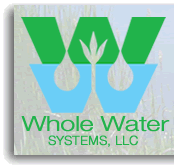Frequently Asked Questions
Is there a depth limitation?
Can I heat the pool water?
Yes you can. The extent of just how much heating you can do to your pool depends on what climate you live in and what seasons you are using the pool. Natural swimming pools are generally warmer than conventional pools because of their treatment area. The treatment area, as a shallow basin, acts as a passive solar collector and transfers heat through the water that is exchanged between treatment and swimming areas.
How much do they cost?
The up-front cost of NSPs is generally more than conventional swimming pools due to a larger surface area (addition of a
treatment area) as well as the additional expense of aquatic plants which are facilitating the treatment process. However, while upfront costs can be higher for NSPs, the longterm costs will be lower in the long run because they require less maintenance and less chemical treatment.
Will there be mosquitoes?
No. Because the water in a natural swimming pool is in constant motion between the treatment area and the swimmig area, NSPs do not provide an adequate habitat for mosquitos.
Can I convert my existing pool?
Yes. Depending on the design of your existing pool, we can reuse a large part or a small part of your existing pool. Key to retrofits is that we need to have enough adjacent land for the treatment area. Please feel free to contact us with specific inquiries.
How big does the regeneration zone have to be?
In general, you should allow 30-40% of the surface area of the swimming pool for the treatment area. This number may vary depending on the depth/volume of the pool, whether it is a retrofit or a new construction, and frequency of use.
What types of plants can I use in my regeneration zone?
Can I put fish in my natural pool?
Unfortunately you cannot. Although they would likely do well in your NSP, they can introdue a constant amount of fecal matter.
I live in a cold climate, what will happen to the pool in the winter?
Depending on what type of system you have (constructed wall pool or graded pond) your system will be drained or simply freeze just as a pond would. The plants regenerate in the spring.
I live in the dessert where we get a lot of evaporation, how does this affect my pool?
What type of maintenance does a natural swimming pool require?
The major differenec between a traditional pool and a NSP is that you will not need to constantly check and add to chemical levels. Maintenance for a NSP includes periodically emptying skimmer filters and pump filters as well as maintaing your water garden treatment area (just like a regular garden, trimming back plants, pulling out unwanted plants, etc)
What happens if there is an "accident" in the pool?
How do you kill all of the bacteria and the "nasties" that occur in a typical chlorinated pool?
Our systems do not "kill" the bacteria that get into the pool. While bacteria and "nasties" that occur in a pool may seem gross to us, they are food for plants and microorganisms which break those bacteria down - the same way that mother nature does it.
|


